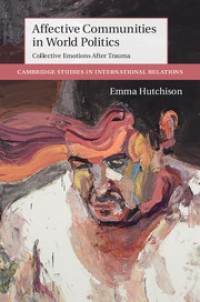Record Detail
Advanced Search
Text
Affective Communities in World Politics : collective emotions after trauma
Emotions underpin how political communities are formed and function. Nowhere is this more pronounced than in times of trauma. The emotions associated with suffering caused by war, terrorism, natural disasters, famine and poverty can play a pivotal role in shaping communities and orientating their politics. This book investigates how 'affective communities' emerge after trauma. Drawing on several case studies and an unusually broad set of interdisciplinary sources, it examines the role played by representations, from media images to historical narratives and political speeches. Representations of traumatic events are crucial because they generate socially embedded emotional meanings which, in turn, enable direct victims and distant witnesses to share the injury, as well as the associated loss, in a manner that affirms a particular notion of collective identity. While ensuing political orders often re-establish old patterns, traumatic events can also generate new 'emotional cultures' that genuinely transform national and transnational communities.
Availability
| 1992/PUP/2016 | 327.1019 HUT a c.1 | Perpustakaan Universitas Pertamina | Available |
Detail Information
| Series Title |
-
|
|---|---|
| Call Number |
327.1019 HUT a
|
| Publisher | Cambridge University : Cambridge., 2016 |
| Collation |
xviii, 350 p. : Illust. ; 24 cm
|
| Language |
English
|
| ISBN/ISSN |
9781107095014
|
| Classification |
327.1019
|
| Content Type |
-
|
| Media Type |
-
|
|---|---|
| Carrier Type |
-
|
| Edition |
-
|
| Subject(s) | |
| Specific Detail Info |
-
|
| Statement of Responsibility |
-
|
| Department(s) |
Other version/related
No other version available











